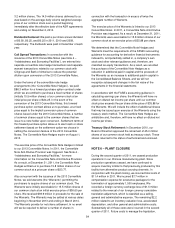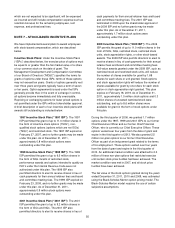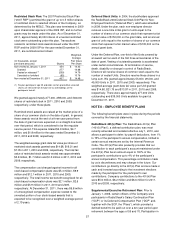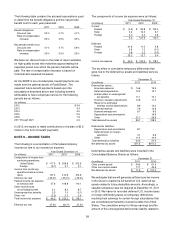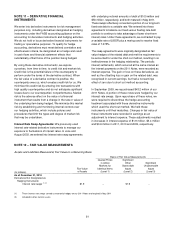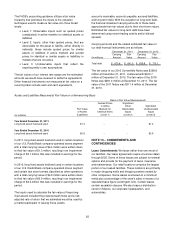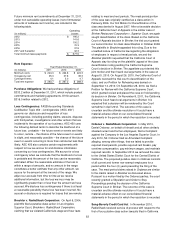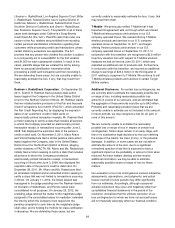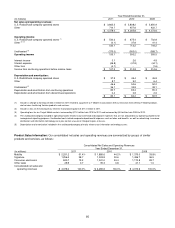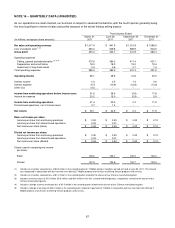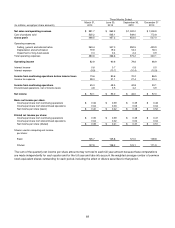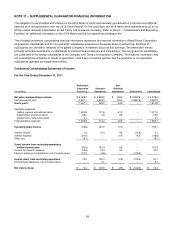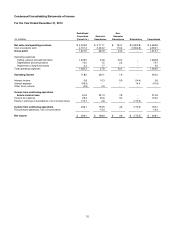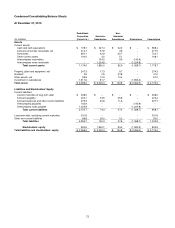Radio Shack 2011 Annual Report Download - page 71
Download and view the complete annual report
Please find page 71 of the 2011 Radio Shack annual report below. You can navigate through the pages in the report by either clicking on the pages listed below, or by using the keyword search tool below to find specific information within the annual report.
63
Future minimum rent commitments at December 31, 2011,
under non-cancelable operating leases (net of immaterial
amounts of sublease rent income), are included in the
following table.
(In millions)
Operating
Leases
2012 $ 195.2
2013 141.6
2014 100.2
2015 70.3
2016 37.9
2017 and thereafter 32.3
Total minimum lease payments $ 577.5
Rent Expense:
Year Ended December 31,
(In millions) 2011 2010 2009
Minimum rents $ 224.3
$ 224.6
$ 224.3
Occupancy cost 35.3
37.6
39.3
Contingent rents 4.1
5.0
4.7
Total rent expense $ 263.7
$ 267.2
$ 268.3
Purchase Obligations: We had purchase obligations of
$333.2 million at December 31, 2011, which include product
commitments and marketing agreements. Of this amount,
$316.0 million related to 2012.
Loss Contingencies: FASB Accounting Standards
Codification Topic 450 - Contingencies (“ASC 450”)
governs our disclosure and recognition of loss
contingencies, including pending claims, lawsuits, disputes
with third parties, investigations and other actions that are
incidental to the operation of our business. ASC 450 uses
the following defined terms to describe the likelihood of a
future loss: probable – the future event or events are likely
to occur, remote – the chance of the future event or events
is slight, and reasonably possible – the chance of the future
event or events occurring is more than remote but less than
likely. ASC 450 also contains certain requirements with
respect to how we accrue for and disclose information
concerning our loss contingencies. We accrue for a loss
contingency when we conclude that the likelihood of a loss
is probable and the amount of the loss can be reasonably
estimated. When the reasonable estimate of the loss is
within a range of amounts, and no amount in the range
constitutes a better estimate than any other amount, we
accrue for the amount at the low end of the range. We
adjust our accruals from time to time as we receive
additional information, but the loss we incur may be
significantly greater than or less than the amount we have
accrued. We disclose loss contingencies if there is at least
a reasonable possibility that a loss has been incurred. No
accrual or disclosure is required for losses that are remote.
Brookler v. RadioShack Corporation: On April 6, 2004,
plaintiffs filed a putative class action in Los Angeles
Superior Court, Brookler v. RadioShack Corporation,
claiming that we violated California's wage and hour laws
relating to meal and rest periods. The meal period portion
of the case was originally certified as a class action in
February 2006. Our first Motion for Decertification of the
class was denied in August 2007. After a favorable decision
at the California Court of Appeals in the similar case of
Brinker Restaurant Corporation v. Superior Court, we again
sought decertification of the class. Based on the California
Court of Appeals decision in Brinker, the trial court granted
our second motion for class decertification in October 2008.
The plaintiffs in Brookler appealed this ruling. Due to the
unsettled nature of California law regarding the obligations
of employers in respect of meal periods, we and the
Brookler plaintiffs requested that the California Court of
Appeals stay its ruling on the plaintiffs’ appeal of the class
decertification ruling pending the California Supreme
Court’s decision in Brinker. The appellate court denied this
joint motion and then heard oral arguments in the case on
August 5, 2010. On August 26, 2010, the California Court of
Appeals reversed the trial court’s decertification of the
class, and our Petition for Rehearing was denied on
September 14, 2010. On September 28, 2010, we filed a
Petition for Review with the California Supreme Court,
which granted review and placed the case on hold pending
its decision in Brinker. On November 8, 2011, the California
Supreme Court heard oral arguments in Brinker. It is
expected that a decision will be rendered by the Court
sometime in April 2012. The outcome of this case is
uncertain and the ultimate resolution of it could have a
material adverse effect on our consolidated financial
statements in the period in which the resolution is recorded.
Ordonez v. RadioShack Corporation: In May 2010,
Daniel Ordonez, on behalf of himself and all other similarly
situated current and former employees, filed a Complaint
against the Company in the Los Angeles Superior Court. In
July 2010, Mr. Ordonez filed an Amended Complaint
alleging, among other things, that we failed to provide
required meal periods, provide required rest breaks, pay
overtime compensation, pay minimum wages, and maintain
required records. In September 2010 we removed the case
to the United States District Court for the Central District of
California. The proposed putative class in Ordonez consists
of all current and former non-exempt employees for a
period within the four (4) years preceding the filing of the
case. The meal period claims raised in Ordonez are similar
to the claims raised in Brookler as discussed above.
Pursuant to a motion filed by the Ordonez parties, the court
recently granted a Stipulation and Order to Stay
Proceedings pending the decision of the California
Supreme Court in Brinker. The outcome of this case is
uncertain and the ultimate resolution of it could have a
material adverse effect on our consolidated financial
statements in the period in which the resolution is recorded.
Song-Beverly Credit Card Act: In November 2010,
RadioShack received service of process with respect to the
first of four putative class action lawsuits filed in California



